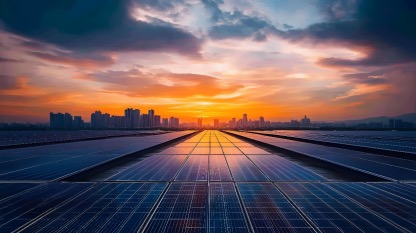The 20 characteristics of solar panels cover a wide range of aspects, including technology, performance, application, and environmental adaptability:
High-efficiency photovoltaic conversion: Based on the photovoltaic effect, sunlight is directly converted into electricity. The conversion efficiency varies depending on the material (for example, single-crystal silicon can reach 20%-25%).
Material diversity: Mainstream materials include single-crystal silicon, polycrystalline silicon, thin-film materials (such as cadmium telluride and copper indium gallium selenide), and emerging perovskite materials.
Long-life design: High-quality solar panels can last for more than 25 years and exhibit low light attenuation.
High stability: Monocrystalline silicon solar panels have neatly arranged crystals, stable performance, and are suitable for long-term use.
Flexibility: Thin-film solar panels are lightweight and flexible, allowing them to be installed on curved or irregular surfaces.
Environmental resistance: The surface is protected by glass and/or plastic, providing weatherproof and UV protection.
Low-reflection coating: A suede structure and anti-reflection film technology reduce initial light reflection loss to less than 5%.
Temperature Sensitivity: Efficiency decreases with increasing temperature (temperature coefficient approximately -0.3% to 0.5%/°C), requiring optimized heat dissipation in high-temperature environments.
Weak-Light Responsiveness: Some materials, such as thin-film modules, can maintain power generation efficiency even in low-light conditions.
Environmentally Friendly: The power generation process is carbon-free, meeting sustainable development requirements.
Modular Design: Supports series or parallel expansion to accommodate power generation needs of varying scales.
Distributed Power Supply: Suitable for residential, commercial, and off-grid applications, reducing reliance on centralized power grids.
Portable Applications: The lightweight design enables use in mobile devices, vehicle charging, and outdoor power sources.
Building Integration Potential: Semi-transparent perovskite panels can be incorporated into smart windows, achieving dual functions of power generation and daylighting.
High Space Utilization: Monocrystalline silicon panels offer high conversion efficiency, making them suitable for limited surface areas such as rooftops.
Mounting Flexibility: The flexible nature of thin-film modules enables unconventional installations, such as on walls and rooftops.
Strong Weather Resistance: The aluminum alloy frame design enhances resistance to mechanical impact and withstands harsh weather conditions.
Low Maintenance: No moving parts, low failure rate, and high long-term operational stability.
Energy Storage Compatibility: Compatible with battery systems for continuous power supply at night or on rainy days.
Continuously Decreasing Costs: Technological advances are driving down manufacturing costs, creating broad prospects for large-scale application.
These characteristics give solar panels significant advantages in residential power supply, commercial energy management, off-grid systems, and innovative applications, making them a core technology in the clean energy transition.

Sun Earth Solar produces superior solar panels, renowned for their superior efficiency and durability. These products consistently exceed industry standards and undergo rigorous quality inspections. The Sun-Earth team's expertise ensures customized solutions, and their commitment to sustainability, aligned with global green goals, makes Sun Earth a trusted partner.
Ningbo Sun Earth warmly welcomes you to contact us. Whether you would like to inquire about our solar panels, require detailed technical specifications, explore partnership opportunities, or have any other inquiries, our dedicated team is ready to provide prompt and attentive assistance. Feel free to contact us by phone, email, or visit our website – we look forward to hearing from you!
Keywords:
Sun Earth Solar, Ningbo Sun Earth, Sun-Earth, Sun Earth, solar panels


